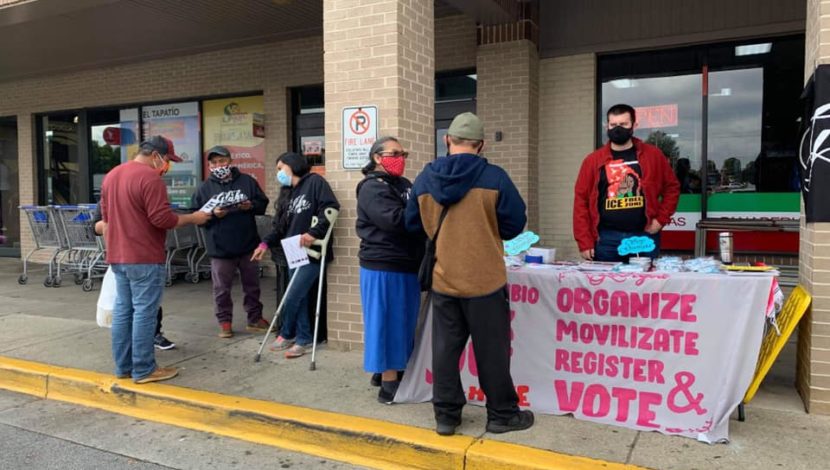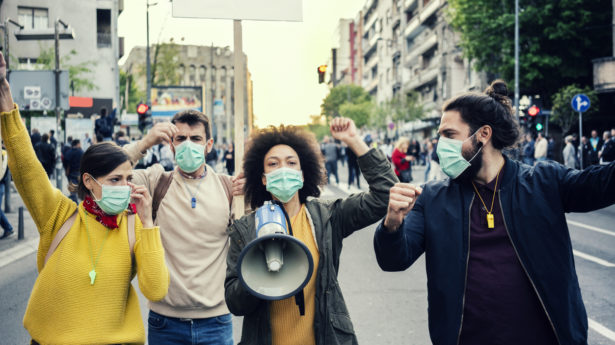The Unitarian Universalist Service Committee advances human rights through grassroots collaborations.
Four Years of Grassroots Struggle Achieve Electoral Wins for Justice

By UUSC Staff on November 12, 2020
For the last four years, UUSC has maintained a steady commitment to mobilizing our base to support justice efforts across the nation. UUSC has partnered with local grassroots organizations building power to make change on the ground, confront the criminalization of communities of color that unfolded after the 2016 presidential election, and strengthen organizing leading up to the historic 2020 election.
Where We Started: The 2016 Election
In November 2016, we faced a sobering reality we knew would greatly impact our work. President Trump entered office with an explicitly anti-immigrant agenda, coupled with a determination to ignore the climate crisis and gut environmental protections. We realized this would require us to focus on a multi-pronged organizing and policy approach to help protect a wide swath of targeted communities. Not only would human rights be under immediate and drastic attacks, but we knew many would experience greater inequity as federally-funded programs were cut. We knew we would need to support organizing capacity across the country, provide resources and tools, and tell stories from our work about strong alliances that foster a spirit of resistance and hope.
We followed the lead of movement groups like Mijiente to understand what immigrant communities most impacted by injustice were asking for in the moment. We strategized at the local level, realizing that an obstructionist Congress would impede progress to make changes in national policy. Our aim was crystal clear: to protect people whose human rights are most at risk. We sought to collaborate with and enhance existing grassroots organizing around community-based protections across the United States, and wherever possible to collaborate with UU organizations and congregations. We saw this immediate effort as creating longer-term, intersectional movement-building benefits for our partners, congregations, and supporters.
In addition to mobilizing effective grassroots organizing and policy advocacy at the local, state, and national levels, we knew we would need to help galvanize various forms of on-the-ground resistance and solidarity with at-risk communities providing direction and leadership.
UUA and UUSC Create Love Resists
From this, our joint UUA-UUSC Love Resists organizing strategy was born. We knew that people-powered resistance would serve as effective protection. The call to provide sanctuary for all was a symbolic, exemplary act of resistance we knew would inevitably weaken and stall the Trump administration’s efforts to demonize and deport immigrants and repress citizens’ efforts to achieve racial, social, and economic justice.
This moment in history also provided an opportunity for us to work with partners to develop a cultural counter-narrative to challenge the Trump administration and begin shifting public opinion. Over time, we know that our UU community and members could engage in transformative actions which lift our country out of existing divides in ways that contribute to building beloved community through longer term electoral wins as well as grassroots movement-building. This vision for our work is situated in a call that is about compassion, empathy, justice, and resistance—a call to live our values.
Looking back over the past four years, we celebrate the local successes of our partners:
Arizona
Several coalitions worked together to recruit individuals, religious institutions, and secular organizations willing to provide sanctuary to undocumented persons. These coalitions also led grassroots efforts in congressional districts to call attention to President Trump’s anti-immigrant and racist speech. In 2018, we saw the impact of this work when congressional support for Trump’s child separation policies started to disappear; congressional Republicans began to turn away from President Trump and denounced his executive actions and manipulation of federal agencies such as Immigration and Customs Enforcement (ICE).
UUSC also supports a community organizer through the UU Justice Arizona Network (UUJAZ). The network mobilizes people to show up at city council meetings (in person and online) and advocate for policy changes that are most needed. One of these has been the push for civilian oversight of the Phoenix Police Department, which finally passed in April this year.
Local efforts for more police accountability also resulted in some terrific progress in Maricopa County this election season, where the new county attorney pledged to end cash bail, cancel contracts with private prisons, decarcerate up to 50 percent of the jailed population, and prosecute police misconduct and political corruption.
Grassroots community groups came together for mutual aid, forming the Undocumented Workers’ Relief Fund, which provides direct support for undocumented migrants during the COVID-19 crisis. UU congregations throughout the state participated in raising funds for the effort. Rent, food, transportation, and other needs were covered for the most vulnerable people in the community while movement building for social justice was strengthened.
Georgia
UUSC partner, the Georgia Latino Alliance for Human Rights (GLAHR) is celebrating the success of their local campaign, Soy Georgia, which bore fruit in the 2020 election, including electing two candidates for sheriff who have pledged to end participation in the 287(g) program in Cobb and Gwinnett counties. This program deputizes local law enforcement to act in the capacity of ICE agents, and has resulted in racial profiling and a wave of terror against immigrant communities wherever it has been implemented. The elections of Craig Owens and Keybo Taylor are historic not only because of their pledge to cease participation in this odious program, but also because they are the first Black sheriffs in the history of their counties.
Prior to this victory, with UUSC’s funding, GLAHR co-convened coalition meetings and facilitated strategic planning to stop the renewal of 287(g) contracts in DeKalb and Cobb counties. The Emerson UU congregation in Marietta, GA worked together with GLAHR, Project South, UU activists, and other allies over the last several years to meet with Cobb County Sheriff Neil Warren, providing reports and facts on how the 287(g) program harms immigrant communities, and showed up to testify at 12 separate Commissioners’ meetings. The work of building community, of creating alliances and of advancing human rights was part of the work that helped create this path for transformative change at the local level.
Illinois
One of the UU state action networks UUSC has supported in its organizing is the UU Advocacy Network of Illinois (UUANI), named as this year’s recipient of the award for Team Building for Change. The award comes from the Canada-based Institute for Change Leaders, which helped UUANI offer training in the outreach and organizing technique known as “deep canvassing.” Hundreds of UUs were impacted by the training and the increased capacity it created for movement-building at this critical time of local and national engagement for change. UUSC has supported UUANI’s organizing in Illinois both through grants to the network and through skills training via the UU College of Social Justice.
***
About UUSC: Guided by the belief that all people have inherent worth and dignity, UUSC advances human rights globally by partnering with affected communities who are confronting injustice, mobilizing to challenge oppressive systems, and inspiring and sustaining spiritually grounded activism for justice. We invite you to join us in this journey toward realizing a better future!
Photo Credit: GLAHR’s Facebook Page

